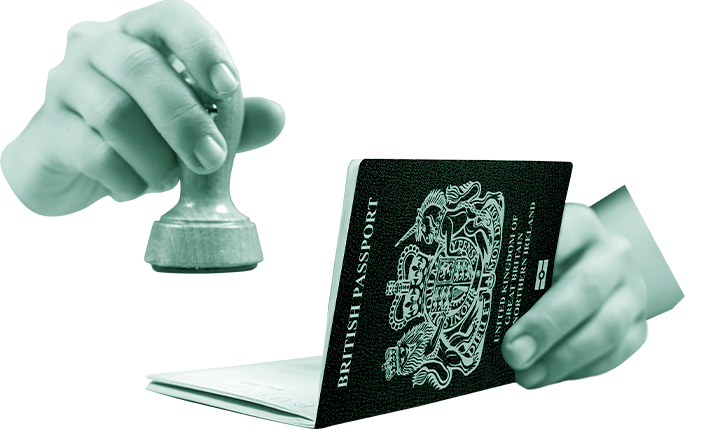Let's Talk

Need Help Urgently?
Call our 24 hour rapid response team now on 0333 311 1090
Request a callback
"*" indicates required fields


Navigating the UK’s work visa system can be tough for companies that want to grow worldwide. The UK Global Business Mobility sponsor licence offers an easier way for businesses to bring overseas workers to the UK for a short time. This system helps companies keep a UK presence while enjoying benefits from international trade and skills.
The Global Business Mobility Sponsor Licence is a permission given by the UK Home Office. It allows businesses to sponsor overseas workers for short-term jobs in certain categories. This licence is very important for companies that want to create a presence in the UK, move skilled staff, or meet contracts with other businesses abroad.
The licence allows companies to sponsor workers through five different Global Business Mobility routes. Each route is designed for a specific business need. This licence shows that the UK government trusts the sponsoring company and believes it can manage the workers they sponsor.
The Global Business Mobility sponsor licence helps bring global businesses and workers to the UK. This plan aims to support economic growth and encourage international teamwork. It makes it easier for companies from outside the UK to send skilled workers here or set up a branch in the UK.
This scheme mainly aims to help the UK by creating new jobs, attracting investments, and increasing international trade. It allows UK businesses to reach out to a global talent pool and grow their business across borders.
Additionally, the licence makes sure that only real businesses that truly need overseas workers can use this route. This helps protect the UK job market and the public good.
The Global Business Mobility route has five different categories for different business needs:
Meeting the right eligibility criteria is very important for businesses that want to apply for a Global Business Mobility Sponsor Licence. This helps to make sure that the businesses are real and can responsibly sponsor foreign workers. It also helps them to contribute positively to the UK economy.
The Home Office carefully checks all applications. This is done to protect the UK job market and keep the immigration system strong. It is vital to understand these requirements for a successful application process.
The basic needs for a Global Business Mobility Sponsor Licence make sure that businesses act in a legal and responsible way:
In addition to the general requirements, each visa category has specific eligibility criteria.
Visa Category | Specific Criteria |
Senior or Specialist Worker | Genuine vacancy, skills and salary requirements met, linked UK business (ownership or joint venture). |
Graduate Trainee | Enrolment in a graduate training programme, placement aligned with the programme, linked UK business. |
UK Expansion Worker | Credible expansion plan, proven overseas trading presence, UK footprint to establish a branch. |
Service Supplier | Contract for supplying services covered by a UK trade agreement, no UK market access restrictions for the service. |
Secondment Worker | Secondment linked to a high-value contract or investment (£10m+ annually or £50m+ total). |
For instance, the Skilled Worker route requires meeting skill level requirements, while the Service Supplier route mandates adherence to relevant UK trade agreements. Similarly, the UK Expansion Worker route requires demonstrating a credible expansion plan for a UK branch or subsidiary.
The Global Business Mobility Sponsor Licence application process has several important steps. Each step needs careful attention to detail and must follow UK Home Office rules.
To make sure your application goes well, you need to prepare fully, provide accurate documents, and submit everything on time.
Before you start the online application for a Global Business Mobility Sponsor Licence, make sure to gather all the needed documents and information. This careful preparation is important for getting good results.
First, check the sponsor guidance given by the Home Office. Look closely to find out what specific documents you need for the Global Business Mobility (GBM) route you have chosen. These commonly include:
Once your documentation is ready, apply online at the UK Visa and Immigration (UKVI) website. Make sure all your information is correct and complete. This helps to avoid delays or rejections.
You will need to pay the application fee, which can change depending on your business size and the type of licence. Don’t forget to send the supporting documents within five working days after you submit the online application.
It usually takes up to eight weeks to process, but this time can vary based on how complex your application is and how many applications are being handled. If you want a faster decision, think about using the priority service, which typically gives a response in about ten working days, but costs more.
Keep in mind that even if your application is successful, it doesn’t mean you will automatically get a licence. The Home Office might do a compliance visit to check your information and see if you can meet sponsor duties.
After you submit your application, the Home Office looks at it carefully. They check your information, review if you are eligible, and might run background checks on your business and key people.
If you are approved, you will get a message from the Home Office with their decision. You will then be able to use the Sponsorship Management System (SMS). This online tool helps you manage your sponsor licence, give out Certificates of Sponsorship (CoS), and report to the Home Office.
If you apply for the UK Expansion Worker route, you will probably get a provisional rating at first. This lets you give a CoS to your Authorising Officer so they can move to the UK. After they arrive, you can apply to upgrade to an A-rating. This allows you to sponsor other workers.
Before you apply for and manage a Global Business Mobility Sponsor Licence, it is important to know the costs involved. These costs include more than just the initial application fee. They can change based on the type of licence, the size of your business, and how many overseas workers you plan to sponsor.
If you ignore these costs, it could lead to unexpected problems later on. So, understanding these expenses will help you get ready to handle the financial side of sponsoring workers from abroad.
The first cost to think about is the sponsor licence application fee. If you are applying for a Senior or Specialist Worker licence, this fee will change depending on the size of your business and if it is a charity. Small or charitable sponsors pay less than medium or large sponsors.
For other GBM routes, known as “temporary worker” routes, there is a standard fee that applies no matter the size or charitable status. This makes it easier to figure out the cost. Once you have the licence, giving a Certificate of Sponsorship (CoS) to each worker you sponsor adds another fee. This fee varies based on the worker’s route.
Another cost to consider is the Immigration Skills Charge. This applies only to the Senior or Specialist Worker route. This charge is paid for each worker you sponsor. It depends on the size of the business and how long the worker will stay in the UK.
When you start your sponsorship, don’t forget to think about other costs you will have. These can include:
Getting a Global Business Mobility Sponsor Licence means you have important duties. These responsibilities go beyond just applying for the licence. They are key to keeping your sponsor licence and making sure that both your business and the workers you sponsor have a good and legal experience.
If you do not follow these rules, you might face penalties. These can include losing your licence, having it suspended, or even canceled. It is very important for any business that sponsors someone to understand and follow these responsibilities.
Adhering to compliance duties and keeping detailed records are a must for being a sponsor. These actions show that you are committed to UK immigration laws. They also ensure transparency about what your sponsored workers are doing.
As a sponsor, you have to carefully watch worker attendance and report any changes in their situation, like job role or address. You need to stop illegal working and make sure workers follow their visa rules.
Keeping accurate records is very important too. This means you should save copies of workers’ passports and visas, employment contracts, and any other important documents for their right to work. These records help prove your compliance during Home Office checks or inspections.
Regular reporting to the Home Office is very important to keep your sponsor licence. This helps the Home Office stay updated about your business and your sponsored workers. It also makes sure everything is open and fair.
You must report specific events on time. This means telling the Home Office if there are changes in your company’s details. For example, if your contact information changes, or if there are changes to the key personnel, like the Authorising Officer or Key Contact. You should also report if your business is facing any financial troubles.
Additionally, you need to report big changes in your sponsored workers’ situations. This includes if they leave your job sooner than expected, if their job role changes a lot, or if they are absent from work for a long time.
Managing your Global Business Mobility Sponsor Licence well is very important. It helps you get the most from it and keep your sponsorship program proper and fair.
You need to know how to assign Certificates of Sponsorship. It’s also vital to keep good records. Additionally, you must manage your licence carefully to make sure it stays valid and fits your business needs.
Assigning Certificates of Sponsorship (COS) is really important in global business mobility. These certificates allow UK businesses to sponsor overseas workers. This includes roles like specialist workers, secondment workers, and graduate trainees. The authorized officer for the UK business needs to know the sponsor duties well. They must fill out the online application form correctly. It’s key to follow Home Office rules to keep the sponsor license active.
Your Global Business Mobility Sponsor Licence usually lasts for four years. It is very important to manage it well during this time. Check your sponsor duties regularly and keep updated on any changes in UK immigration rules and regulations.
You can change your licence if your situation changes. This could be adding a new GBM route or updating details about your organization. Use the SMS to manage your licence, track CoS allocations, and quickly report any changes to the Home Office.
Remember, if you do not follow your sponsor duties or if you do not renew your licence before it ends, you could face serious issues. This could mean your licence gets cut back, suspended, or even taken away. Such problems can disrupt your business and make it hard for you to hire talented people from overseas.
In conclusion, getting a UK Global Business Mobility Sponsor Licence is important for your business. It helps in moving talent internationally. To manage this licence well, you need to know the eligibility rules, how to apply, the costs, and your duties as a sponsor. By following the rules and managing your responsibilities, you can handle the Global Business Mobility route easily. It is also important to stay updated on processing times, eligibility for small businesses, and the differences between visa types to make smart choices. If you plan to apply for the licence, make sure you are ready for this journey of global business growth.
The Home Office usually takes about eight weeks to process the global business mobility sponsor licence. If you need your application faster, there is a priority service. With this option, you can get a decision in ten working days.
Yes, small businesses can apply for the Global Business Mobility sponsor licence if they meet the eligibility requirements. The sponsor guidance gives a clear description of what a small business is. This helps potential applicants understand better.
The UK Expansion Worker visa is for overseas companies that want to start a business in the UK. It lets senior managers or specialists open a branch or subsidiary here. On the other hand, the Senior or Specialist Worker visa is for short-term jobs. This applies to people working in a UK business that is already connected through ownership or a joint venture agreement.


Call our 24 hour rapid response team now on 0333 311 1090
"*" indicates required fields
"*" indicates required fields